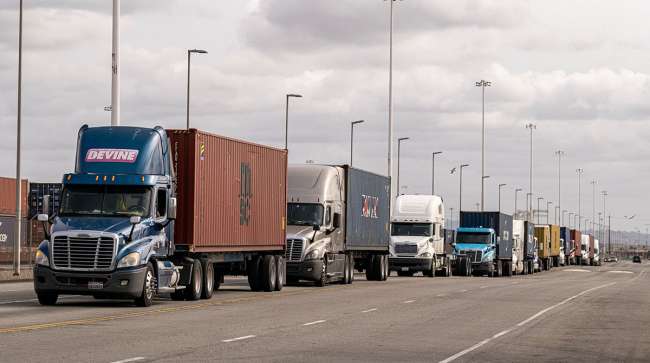Senior Reporter
Freight Stakeholders Seek Supply Chain Action From Biden

[Stay on top of transportation news: Get TTNews in your inbox.]
WASHINGTON — American Trucking Associations joined nearly 100 freight stakeholders in calling on President Joe Biden to amplify his administration’s response to ongoing supply chain woes nationwide.
The industry groups, representing trucking firms, manufacturers and distributors, outlined proposals meant to alleviate freight connectivity concerns. They included a program that would allow commercial drivers under 21 to operate vehicles interstate, as well as elevating the profile of supply chain sector careers.
The groups also proposed providing workforce flexibility with COVID-19 vaccine mandates, a regulatory pause related to truckers’ allowable hours of operation and a further examination of the cause of supply chain bottlenecks.
“We encourage the administration to continue to investigate the causes of inefficiencies at our nation’s ports, draw input from a wide variety of supply chain stakeholders and work collaboratively to minimize the bottlenecks and operational practices that prevent the seamless movement of cargo through the supply chain,” the groups wrote to Biden.
They included the American Chemistry Council, the American Farm Bureau Federation, the National Restaurant Association, the National Retail Federation and the National Roofing Contractors Association.
Supply Chain Letter by Transport Topics
They added: “Through continued dialogue and information sharing, appropriate action can be taken to ensure resources and equipment are utilized efficiently and effectively to improve performance at our nation’s ports.”
ATA is among stakeholders endorsing the Developing Responsible Individuals for a Vibrant Economy, or DRIVE, Safe Act. Sponsored by Sen. Todd Young (R-Ind.), the bill is included in a Senate-passed $1 trillion infrastructure measure awaiting a vote in the U.S. House. The DRIVE Safe Act would pave the way for training via an apprenticeship for drivers younger than 21 so they may operate trucks interstate. The legislation responds to an industrywide shortage of truck drivers. ATA Chief Economist Bob Costello recently indicated trucking is short at least 80,000 drivers.
At a hearing of the House Agriculture Committee on Nov. 3, Jon Samson, vice president of conferences and executive director for the Agricultural and Food Transporters Conference at ATA, reaffirmed the industry’s workforce statistics.
“The retention issues, bringing on new drivers; attracting new drivers, has been an extraordinarily difficult task and something that we have been fully involved in, focused on and hope to have some positive results within the next couple of years,” Samson told the committee. Specific to the supply chain, he added, “The port productivity issues that we’re facing, everybody’s well aware of them and we’re trying, from a carrier angle, to work through the supply chain issues and come out with something that is going to be workable for everyone.”
Committee Chairman David Scott (D-Ga.) acknowledged the trucking industry’s workforce concerns. At the hearing, he observed, “We have got to move urgently and put together a major recruitment and retention program for commercial truck drivers.”
ATA and the other stakeholders’ message to the president came on the heels of House Republicans sounding the alarm about supply chain crises. Transportation and Infrastructure Committee ranking member Rep. Sam Graves (R-Mo.) was among 160 GOP members pressing the White House to increase its response to ongoing freight connectivity concerns.
As he put it in a recent interview: “The problem is the administration’s policies. When you throw in extended unemployment benefits, when you throw in arbitrary vaccine mandates. That just creates all kinds of logistical problems for trucking companies, for transport companies, and the rail lines and everything that goes along with it.”
He emphasized, “That’s making the problem just as bad. When the president says that the private sector needs to step up, well he also needs to step up and back off some of these regulatory burdens.”
The White House on Nov. 3 announced it would publish a twice-monthly dashboard detailing metrics tracking progress at the ports of Los Angeles and Long Beach.
Read about how the Biden-Harris Supply Chain Disruptions Task Force is working with the private sector to move a historic amount of goods so they reach the households and businesses who depend on them. https://t.co/SFzxOGh8ea — The White House (@WhiteHouse) November 3, 2021
“Our commitment to tackle bottlenecks and inefficiencies is aimed at helping to get goods to the families and businesses that need them as our economy continues to recover from the pandemic. We will also continue to closely watch the rotation from goods to services consumption, as we expect that rotation to ease pressures on the goods movement supply chain,” said John Porcari, port envoy to the Biden-Harris Administration Supply Chain Disruptions Task Force.
The White House’s announcement follows a series of guidelines meant to facilitate the flow of freight, such as relying on 24/7 operations at the ports of Los Angeles and Long Beach.
Want more news? Listen to today's daily briefing below or go here for more info:




